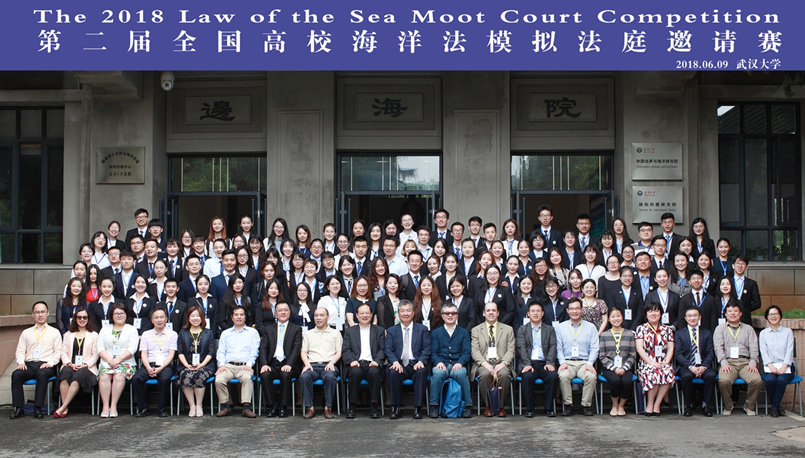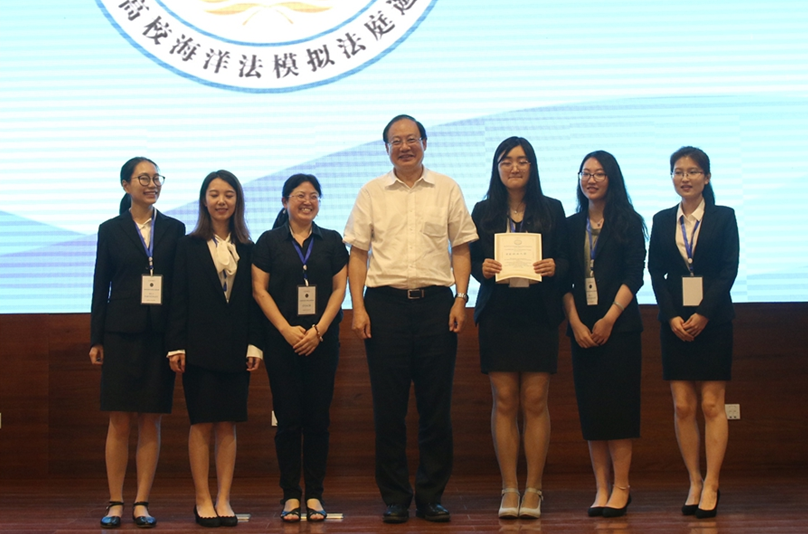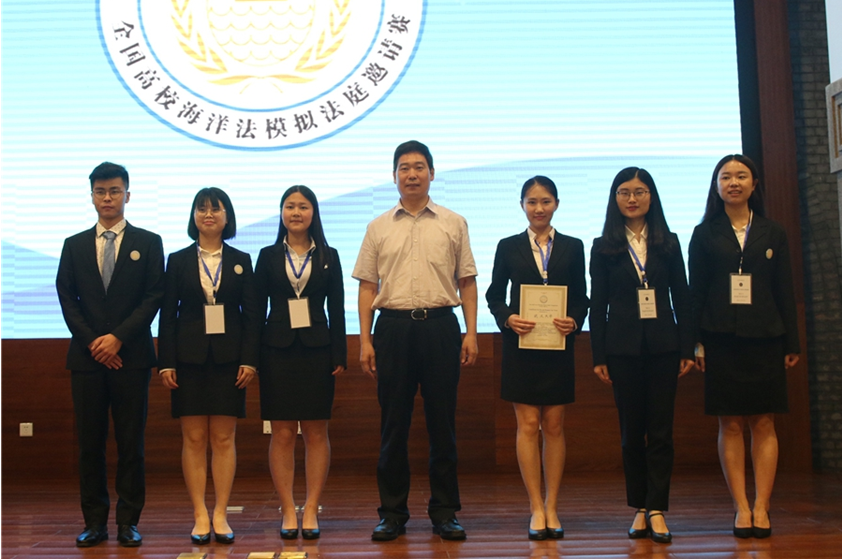On June 9-10, the 2nd Law of the Sea Moot Court Competition was held in Wuhan University. The competition was jointly organized by Collaborative Innovation Center for Territorial Sovereignty and Maritime Rights and the Chinese Society of the Law of the Sea. It was undertaken and executed by Wuhan University China Institute of Boundary and Ocean Studies(CIBOS)and was attended by 17 teams from universities across the country,including Beijing Normal University, Dalian Ocean University, Fudan University, Hainan University, East China University of Political Science and Law, Huazhong University of Science and Technology, Jilin University, Shanghai Jiao Tong University, China Foreign Affairs University, Wuhan University, Southwest Petroleum University, Southwest Minzu University, Northwest University of Political Science and Law, Xiamen University, Ocean University of China, China University of Political Science and Law, Zhongnan University of Economics and Law.

In the report of the 19th National Congress of the Communist Party of China, General Secretary Xi Jinping explicitly stated,"we will pursue coordinated land and marine development, and put more efforts to develop China to become a strong maritime country," and once again blew the horn for building a maritime power.The 21st century is the century ofthe sea. China’s researches on theory and practice of law of the sea and talent cultivation have entered a new stage of development.The first Law of the Sea Moot Court Competition was held in April 2017,attracted 13 high-level universities across the country to attend the competition. It filledgaps in this field and achieved great success.This year's competition invited Mr. GaoZhiguo, the only Chinese judge in the International Tribunal for the Law of the Sea, to serve as the chairman of judges.Judges include diplomats and expert officials from the Ministry of Foreign Affairs, the State Oceanic Administration and other departments, who work in the front line of international law and the law of the sea; experts and scholars in international law or the law of the seafrom universities and research institutions; and practicing lawyers engaged in related work. It includeda large scale of China’s high-level experts and young scholars in the law of the sea.

Photo of the judges in semi-final. From left to right, Yang Li, Deputy Director of Research Center for Oceans Law and Policy,National Institute for South China Sea Studies, FuKuncheng, Dean of Xiamen University Center for Oceans Law and the China Seas, GaoZhiguo, Judge of International Tribunal for the Law of the Sea, ZhangHaiwen, Director General of China Institute for Marine Affairs,State Oceanic Administration, and Liu Yang, Division Chief of The Department of Treaty and Law,Ministry of Foreign Affairs of the People’s Republic of China.
The proceedings of the International Tribunal for the Law of the Sea consist of two parts: written and oral. Given this, the competition chooses English as the language of competition, and simulates the procedure of the International Tribunal for the Law of the Sea. Each participating team submits memorials and counter-memorials for the case of the competition, which concerns the disputes between country A and country N on the legal status of some marine features, the delimitation of the continental shelf and the question whether the law enforcement of country A violates the relevant provisions of the United Nations Convention on the Law of the Sea and the United Nations Charter.The case of this competition touches upon many frontier issues of international law, such as the compulsory jurisdiction of the Convention on the Law of the Sea, the nature of marine features, the criteria of islands and the regime of continental States’ outlying archipelagos. These issues are directly related to our country’s sovereignty and maritime rights problem.
On June 10th, the Grand Final was held in University History Museum of Wuhan University. After intense competition, the team of China University of Political Science and Law won the championship, the team of Xiamen University won the runner-up, and the teams of Wuhan University and East China University of Political Science and Law won the 2nd runner-up. The team of East China University of Political Science and Law won the best applicant’s written submission; the team of China University of Political Science and Law won the best respondent’s written submission. The best debaters include: Li Yunjun and XuZizhi, from China University of Political Science and Law; ChenHaiyan from Hainan University; Zhang Zhuoer and Chen Xi from Fudan University; SuMengting from Northwest University of Political Science and Law; DengLihong from Beijing Normal University; Lu Mengxia and ZhangHaiyang from East China University of Political Science and Law; Qin Zehao and Li Yi from Wuhan University; Fu Bing from China Foreign Affairs University; YaoCongyuan from Xiamen University. Prof. LanHua from China University of Political Science and Law, Prof. Wu Wei from Wuhan University, Prof. ShiYubing and Prof. Yang Fan from Xiamen University, and Prof. Yu Nan won the best coaches.




From top to bottom, the team of China University of Political Science and Law, the team of Xiamen University, the team of East China University of Political Science and Law, and the team of Wuhan University.
At the closing ceremony, Mr. GaoZhiguo, judge of the International Tribunal for the Law of the Sea, represented the judges to comment on the competition. He stated that participants’ eloquent style and English level were very impressive, and that the Law of the Sea Moot Court Competition was of significance to train professionals in the law of the sea, disseminateknowledge of the sea, inspire students to care about the sea, understand the sea, participate in marine affaires, and createa positive atmosphere for the marine development.
Mr. ShenZhuanghai, DeputySecretary of the Party Committee of Wuhan University, made a closing speech and highly praised the competition. Mr. Shenstated, “In the last two days, we gathered in Wuhan University to attend the 2ndLaw of the Sea Moot Court Competition. Today’s grand final is held at the highest academic hall of Wuhan University. The front of the lecture hall hangs the image of two old presidents of Wuhan University, Mr. WangShijie and Mr. ZhouGengsheng, who happened to be predecessors and founders of Chinese international law. They have contributed wisdom toaffaires concerning national core interests of territorial sovereignty and maritime rights and interests, such as the abolition of unequal treaties after World War Ⅱ, the recovery of land and of islands in the South China Sea, and the declaration of China’s territorial baselines. I hope that today’s studies couldbroaden the horizons of young students and inspire young scholars to pay more attention to the major and urgent issues of the country in the future study, and to use their knowledge to serve the country.”
In the early summer, domestic and foreign talents in the law of the sea gathered in Wuhan University, and 2ndLaw of the Sea Moot Court Competition ended successfully.Building China into a strong maritime country is in line with China's development and world’s development dynamics, and is also an inevitable choice to realizeChinese dream of national rejuvenation.The Law of the Sea Moot Court Competition aims to create a professional practice platform for students who are determined to work in the law of the sea.
(Rewritten by Wan Xiaowei)
(Edited by Fu Shanshan)
